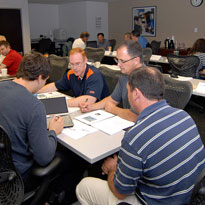UMTS
- Course:UMTS
- Course ID:UMTS-FDD Duration:3 days Where: Your Office (7+ Persons)
- Download Course Description (PDF)
Available as a private, customized course for your group at your offices or ours and in some cases as a WebLive(TM) class.
Course Outline
- UMTS Introduction and Overview
- UMTS releases and the corresponding features
- UMTS network architecture
- UMTS radio technology overview: UMTS Terrestrial Radio Access (UTRA)
- Review of major aspects of spread spectrum techniques as applied to UTRA
- UMTS Radio Interface Protocol Architecture
- Physical layer (Layer 1)
- Data link layer (Layer 2)
- Network layer (Layer 3)
- UMTS Channelization Concepts and Implementation
- UMTS physical channels: Definition, properties, and corresponding usage
- UMTS transport channels: Definition, properties, and corresponding usage
- UMTS logical channels: Definition, properties, and corresponding usage
- Mapping of logical channels to transport channels and associated optimization issues
- Mapping transport channels to physical channels and associated optimization issues
- UMTS Code Structures, Cell Selection, and Cell Reselection Mechanisms
- UMTS scrambling codes: Long codes and short codes usage, properties and optimization
- UMTS channelization codes: Tree codes usage, properties and optimization
- UMTS synchronization channel and its structure and usage in the cell selection/reselection process
- UMTS Speech Coding and Channel Coding Options
- Speech coding and AMR in UMTS (as opposed to AMR in GSM)
- Error control coding
- Convolutional codes
- Turbo codes
- Strengths and weaknesses and associated design, operational, and optimization considerations
- UMTS Spreading and Modulation Specifics
- Specifics of spreading in the Dedicated Channel (DCH)
- Overview of spreading in other channels
- Modulation specifics and associated issues
- UMTS Measurements and Intersystem Handovers
- Compressed mode, measurement methodology, parameters, and optimization issues
- UMTS-to-GSM handovers
- Course Recap and Conclusion
Course in a Nutshell
As UMTS proliferates worldwide, there’s growing demand for a good, strong course on UMTS. This course is that. In this course, you will learn the architecture and operation of UMTS-FDD as it impacts the design and optimization of a UMTS-FDD network.
We will begin with a close look at the architecture of a UMTS network, with emphasis on the FDD mode. We will learn about both the optional and mandatory features of UMTS-FDD. We will also discuss the relationships between the logical channels, transport channels, and physical channels in a good deal of depth. All of this will allow you to exploit the technology’s strengths to come up with better network designs, trouble shoot performance problems, and identify solution approaches. It will also help you interface with vendors more effectively.
Customize It!
Customize this course to your specific needs at little-to-no additional cost. We offer distinct versions of this course tailored for audiences such as:
- Network design and optimization engineers
- Equipment or application designers
- Less technical audiences such as managers, executives, business planners, sales and marketing specialists, and operations and support personnel
Aimed At
Those with some CDMA background who wish to learn more about UMTS-FDD. The standard presentation of this course assumes a bachelor of science in Electrical Engineering, Mathematics, Physics, or a related subject along with an appropriate background in communications engineering.
Prerequisites
- CDMA Technology and Its Evolution to cdma2000 (3 day(s), CDMA)
- Knowledge of the wireless network structure and operation, RF propagation and fading issues, and link budget analysis.
- At least two years experience in the design and optimization of a wireless network using any major technology.
- “I liked the in-depth coverage of the properties of CDMA compared with those of GSM. The instructor was very energetic, personable, and knowledgeable! All the major topics were covered with good individual attention to each. It’s a great overview of UMTS.” – J Klock, Electrical Engineer III, Major Defense Contractor.
- “Very knowledge giving for newcomers and a nice refresher for experienced people. The instructor is very experienced, patient, and polite. The course book is very comprehensive; it covers a lot of information very nicely.” – Jasmine M., Embedded Communications Solutions Provider, Latin America

